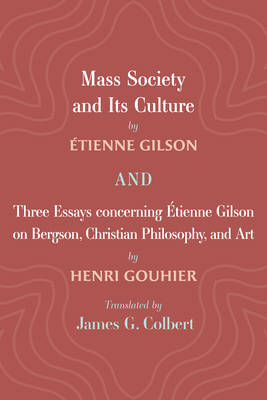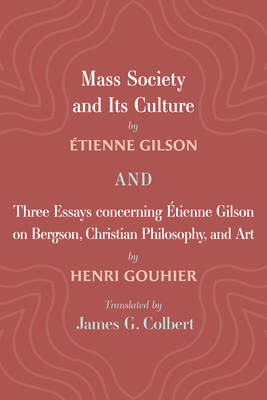
Bedankt voor het vertrouwen het afgelopen jaar! Om jou te bedanken bieden we GRATIS verzending (in België) aan op alles gedurende de hele maand januari.
- Afhalen na 1 uur in een winkel met voorraad
- In januari gratis thuislevering in België
- Ruim aanbod met 7 miljoen producten
Bedankt voor het vertrouwen het afgelopen jaar! Om jou te bedanken bieden we GRATIS verzending (in België) aan op alles gedurende de hele maand januari.
- Afhalen na 1 uur in een winkel met voorraad
- In januari gratis thuislevering in België
- Ruim aanbod met 7 miljoen producten
Zoeken
Mass Society and Its Culture, and Three Essays Concerning Etienne Gilson on Bergson, Christian Philosophy, and Art
Étienne Gilson, Henri Gouhier
Hardcover | Engels
€ 58,45
+ 116 punten
Uitvoering
Omschrijving
A medievalist and defender of the notion of Christian philosophy, Etienne Gilson had a lifelong interest in the philosophy of art. He questioned whether what is reproduced as art in contemporary society is art at all. This is not a simple issue. A cheap version of a novel is still a novel. A picture of a statue is not a statue, nor indeed is a photograph of a painting a painting. Recorded music has particular complications. The organizer of an industrial assembly line is neither an artist nor an artisan. Yet, thanks to such mass production, a much broader population has knowledge of artworks than would otherwise be possible. Religions must minister to mass societies and provide appropriate liturgies. But in the process, there is a danger of misrepresenting complex religious teachings. At the end of his own life, Henri Gouhier, Gilson's first doctoral student, prepared three essays on Gilson. The first, on Bergson, gives a sense of Gilson's formation in early twentieth-century French philosophy. The second reconstructs the development of the notion of Christian philosophy and the heated controversy it provoked. Finally, Gouhier presents Gilson's general philosophy of art and gives a helpful framework to Gilson's comments on art in a mass society.
Specificaties
Betrokkenen
- Auteur(s):
- Vertaler(s):
- Uitgeverij:
Inhoud
- Aantal bladzijden:
- 196
- Taal:
- Engels
Eigenschappen
- Productcode (EAN):
- 9781666717938
- Verschijningsdatum:
- 24/01/2023
- Uitvoering:
- Hardcover
- Formaat:
- Genaaid
- Afmetingen:
- 152 mm x 229 mm
- Gewicht:
- 458 g

Alleen bij Standaard Boekhandel
+ 116 punten op je klantenkaart van Standaard Boekhandel
Beoordelingen
We publiceren alleen reviews die voldoen aan de voorwaarden voor reviews. Bekijk onze voorwaarden voor reviews.









